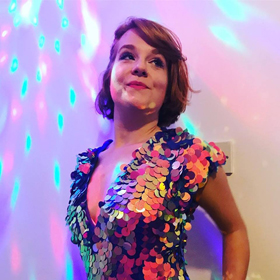Our review of Home, I'm Darling
A Fizzing Domestic Comedy, With A Feminist Bite
 Kitty McCarron, January 3rd, 2019
Kitty McCarron, January 3rd, 2019Terrific Feminist Discourse
What starts as a fizzy domestic comedy very quickly becomes a shattering discourse on feminism, questioning a woman's right to choose how she lives her life.
Our review of the London run in 2018
L.P. Hartley once said "The past is a different country, they do things differently there" and oh boy was he right. This is especially true in the case of the fabulous Home, I'm Darling, now showing at the Duke of York's Theatre following a sell-out run at the National Theatre. Starring a luminous Katherine Parkinson, what begins as a fizzy domestic comedy very quickly becomes a shattering discourse on feminism, questioning a woman's right to choose how she lives her life.
Ostensibly set sometime in the 1950s, Home follows Judy and her husband Johnny (Richard Harrington) who're doing domestic bliss right. In their pastel and authentically period home (excellently detailed set design from Anna Fleischle), things are in balance. Judy is the housewife, presenting breakfast in a perfect poodle skirt and immaculately set hairstyle. Then suddenly the illusion is broken, Johnny leaves for work, and from a drawer, Judy produces a Macbook. It's not the 50s, it's the present, and presently this 'experiment' is failing. Their finances are in disarray, Johnny's commitment to the jig is slipping and Judy is stuck in the middle of it all, holding on for dear life to her fantasy.
This bait and switch is what elevates Laura Wade's play from great to outstanding. Suddenly, we're looking at a couple - a woman who is so afraid of the chaos of the outside world she has created her own one, where she is the ultimate domestic Goddess. Alongside the iconic fashions, cars, and music, we're reminded that the 1950s were when people were kind to each other. It doesn't matter to Judy that that's all hogwash, however, even when it's pointed out that Doris Day and Rock Hudson's sunshine didn't quite touch everyone. So desperate is she to live this life that she seemingly will give up everything to keep it, even her right, the ones Sylvia, her feminist mother (a storming Susan Brown) fought for. It's a powerhouse performance from Parkinson, who manages to mask devastation in a sing-song voice. Judy isn't likably pliant, she is steadfast, stubborn, and complicated like a real woman is.
To say nothing of their friends Fran and Marcus, played by Siubhan Harrison and Hywel Morgan who sock hop onto the stage. From the outside happy, they're also rabid for retro, but not so much that they'll give up the Audi. These weekend warriors calm Judy but also question her, and in an appalling but fantastic scene, proposition her, until finally - alongside an impassioned and incredible speech from Sylvia - the spell is broken.
Whilst it appears that Wade judges people that embark on these quirky lifestyles, what she actually does is create an impressively modern work, not asking why, but rather sorting the fantasy of the 'perfect' marriage from reality, warning us about overindulgence and losing ourselves in our own lies. Gorgeous flouncy dresses, rock and roll records, and film stars are wonderful, but so are mobile phones, honesty, and equality between the sexes.